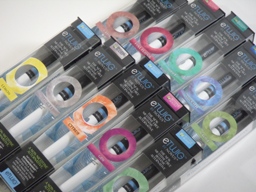e-cigarettes proving to be as effective as nicotine patch, more appealing
In light of the previous headlines talking about the gateway effect concern of e-cigs, here’s another study that further supports the potential benefits of e-cigarettes, even as public policy experts consider the risks and benefits of this new product.
The study showed that e-cigarettes may hold in helping smokers to quit, at least as well as alternatives. The research, published in the Lancet Medical Journal, was performed in New Zealand and tested the effectiveness of nicotine e-cigarettes, nicotine patches, and an e-cigarette without nicotine (described as a placebo, but more on that later).
 The results showed that the nicotine e-cigarette performed better than the patch in quitting, with 7.8% of the users being smoker free after 6 months. This compared to only 5.8% for the patch. 4.1% of those that used the non-nicotine e-cigarettes had quit at the conclusion of the study. The difference between the e-cigs and the patch were not statistically significant based on the study’s design and sample size, but importantly it showed that e-cigarettes are comparable to NRTs, and importantly have a major advantage – consumer demand.
The results showed that the nicotine e-cigarette performed better than the patch in quitting, with 7.8% of the users being smoker free after 6 months. This compared to only 5.8% for the patch. 4.1% of those that used the non-nicotine e-cigarettes had quit at the conclusion of the study. The difference between the e-cigs and the patch were not statistically significant based on the study’s design and sample size, but importantly it showed that e-cigarettes are comparable to NRTs, and importantly have a major advantage – consumer demand.
In an article from NBC News, one of the authors of the study, Dr. Bullen from the University of Auckland, made an interesting observation that is often missed in the debate about e-cigarettes, but is a huge advantage, and one that needs more attention. Smokers actually like to use e-cigarettes, so they are more likely to keep using them and reduce smoking, compared with NRTs.
“While our results don’t show any clear-cut differences between e-cigarettes and patches in terms of quit success after six months, it certainly seems that e-cigarettes were more effective in helping smokers who didn’t quit to cut down,” Bullen said in a statement.
“It’s also interesting that the people who took part in our study seemed to be much more enthusiastic about e-cigarettes than patches, as evidenced by the far greater proportion of people in both of the e-cigarette groups who said they’d recommend them to family or friends, compared to patches.”
The study showed that 57% of those using e-cigarettes had cut in half the number of cigarettes they smoked each day, compared to 41% of those using the nicotine patch. So while neither of these groups fit into the statistics of those who had quit, there are real health benefits to the users and societal benefits.
The other interesting statistic that was hidden in the report is the 4.1% quit rate of those using the non-nicotine e-cigarette. In practice, these non-nicotine e-cigs do not provide the key experience that has been proven to relieve craving – throat hit. So while it offers the tactile aspects of smoking, the vapor and some taste, it is not surprising that it wasn’t as effective as nicotine based e-cigs. Calling it a placebo, however, is unfortunate since the tactile experience is not a placebo effect, but it is real as shown by the success rate they had in the study.
We understood it is the combination of the experience with holding and using a product and the experience of a throat hit that is most effective. We created the Novus Twig and eTwig with that in mind, infusing them with our proprietary BotanicBoost formula that is able to mimic the throat hit smokers crave but without any nicotine or other drugs.


